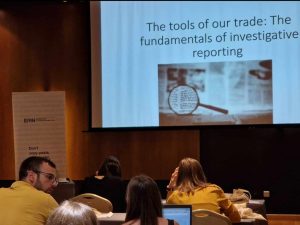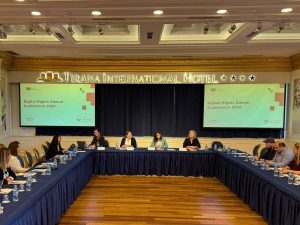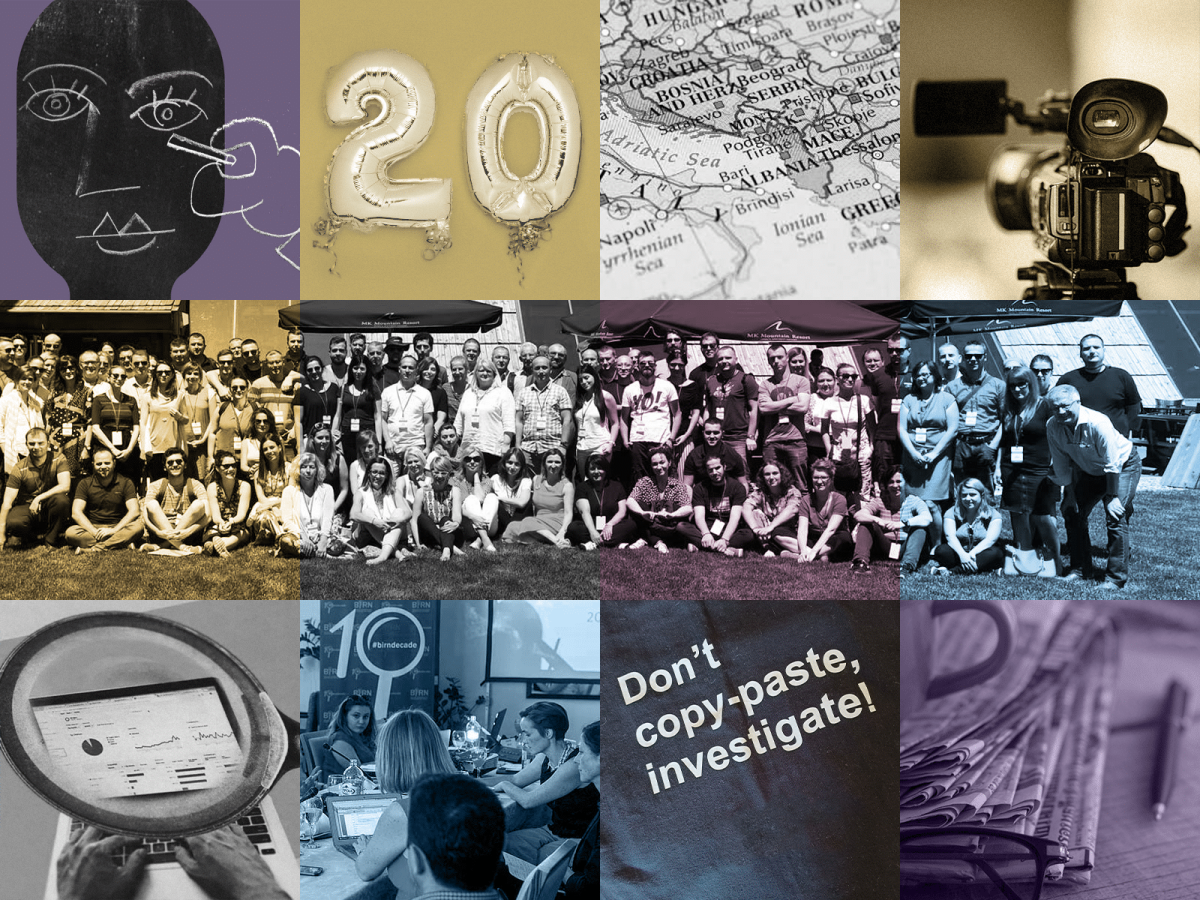By Hamdi Firat Buyuk
When the Balkan Investigative Reporting Network was established in 2005, it was a small, struggling initiative that some believed would not succeed.
BIRN produces in-depth investigative journalism, trains and mentors journalists, and promotes media freedom, transparency and accountability across the Balkans through independent reporting and public interest projects.
BIRN also produces Balkan Insight, its flagship English-language publication, which has grown from a weekly email newsletter to an internationally respected website, and runs dozens of projects at the local, regional and international levels.
Influencing decision-makers

Gordana Igric was one of the five founders of BIRN in 2005, and the organisation’s regional director until 2018. “The five people at the beginning have grown up to some 200 people across the region now,” Igric said.
BIRN country offices produce investigative reports, train local journalists, monitor courts and public spending, and support press freedom and civic accountability through workshops, data tools and legal reporting on issues such as corruption, war crimes and public procurement. They also publish their own reports in local-language websites across the Balkans: Reporter in Albania, Detektor in Bosnia and Herzegovina, Kallxo in Kosovo, Birn.me in Montenegro, Prizma in North Macedonia, Sinopsis in Romania and Birn.rs in Serbia.
Over two decades, Balkan Insight has published more than 70,000 items in English. In 2024, the website had 5.5 million views, one and a half times more than in 2023.
It has become a key source of information about developments in the region, said Nerma Jelacic, one of BIRN’s founders, who went on to become a leading global expert in transnational justice.
“I see from New York to London or when you go to elsewhere that Balkan Insight has the ear of the policy-makers and the decision-makers, and they do read what is being reported,” Jelacic said.
While providing coverage of news and current affairs in the Balkan countries, BIRN has also widened its focus to report from Czechia, Hungary, Poland and Slovakia as part of its Reporting Democracy programme, which scrutinises the issues shaping the future of democracy in Central European EU member states, including the rise of political populism and illiberal regimes.
Multiple awards

One of BIRN’s landmark programmes is the Fellowship for Journalistic Excellence, which aims to nurture high-quality journalism across a region spanning 14 countries, from Poland and the Czech Republic to Greece and Romania.
The Fellowship has been running since 2007 and more than 150 journalists from the region have so far participated in the programme winning multiple local, regional and international awards.
“We needed to train journalists, first of all, in order to have somebody to work with, honestly,” said Dragana Zarkovic Obradovic, the director of BIRN Serbia and the regional director of the Fellowship programme. The programme focuses on in-depth, long-form articles and helps participants improve their skills through mentoring by experienced international editors.
Zarkovic Obradovic said it provides “enough resources and enough time for mid-career journalists to take their careers to the next level through this quite unique experience”.
Kosovo-based journalist Serbeze Haxhiaj was selected to participate in the Fellowship in 2016.
“The topic I chose was sensitive and difficult: the protection of witnesses in war crimes trials,” said Haxhiaj.
Since then, she has won a total of 19 journalism awards for pieces published by BIRN including one about babies born to Kosovo Albanian women raped by Serbian forces during wartime in Kosovo. The story won the first prize in EU Investigative Journalism Awards in Kosovo in 2019.
Since its foundation, BIRN has won 155 local, regional and international awards for its reporting on issues like war crimes, corruption and human rights violations, including prizes for journalism awarded by the European Union, the United Nations, Reporters Without Borders and the Organisation for Security and Co-operation in Europe (OSCE).
But the organisation’s journalistic success over 20 years would not have been possible without people who work in areas like programmes, logistics and finance.
Maida Selmanovic, financial manager at BIRN Hub in Sarajevo, is one of them. Over the past 16 years, she has watched the organisation grow.
“I joined BIRN in January 2008 as a financial officer. At that time, BIRN was still a relatively young organisation, and I was excited about the opportunity to be part of a dynamic team working to make a difference through investigative journalism and media development,” Selmanovic said.
“It has been inspiring to see how BIRN has grown from a smaller regional initiative into a robust network with a wide range of activities across multiple countries.’
There were, of course, many challenges during those years.
“One of the biggest challenges has always been managing complex donor requirements, financial reporting, and compliance in an ever-changing environment. Each project comes with its own set of rules and expectations, which requires precision, flexibility, and constant coordination,” Selmanovic explained.
New challenges

The media environment in the Balkans has changed significantly over the past two decades, with the rise of social media, tabloid-style TV channels and clickbait ‘news’ websites. In many countries, growing authoritarianism, right-wing populism and pressure on the media from governments have posed additional challenges, while the funding of independent media has remained a critical problem for its continued survival.
Selmanovic cites BIRN’s “ability to adapt to new challenges while maintaining a commitment to high-quality investigative journalism” as key to its success.
High-quality reporting is the focus of BIRN’s annual Summer School of Investigative Journalism, which brings journalists together with award-winning editors, top investigative reporters and data journalism experts to explore new developments and boost skills. This year’s Summer School will be held in Pristina, Kosovo.
But as well as programmes aimed at increasing journalistic capacities, BIRN maintains its focus on rights and freedoms with initiatives like its Digital Rights Programme, established in 2019 to promote and protect human rights online.
“The main motivation behind launching the Digital Rights Programme was the growing need to protect citizens and journalists’ digital rights – which are in essence human rights in the digital space – in a time when freedom of expression and access to information are increasingly shifting into the digital sphere,” said Azra Milic, BIRN’s digital rights programme coordinator.
Milic said that as technology advances, so do challenges like surveillance, censorship, disinformation and the misuse of personal data.
“BIRN recognised the importance of these issues and the need for journalists, activists and citizens to be informed and empowered to protect themselves in the digital environment,” she said.
BIRN regularly monitors digital rights violations in ten countries in south-east and central Europe, publishes a Digital Rights Violations Annual Report, prepares policy papers, trains local journalists via grants and fellowships, organises conferences and contributes to Balkan Insight’s coverage of the issues.
As an organisation that grew up in the internet era, in a highly challenging region for independent media, BIRN has come a long way since it was founded in 2005 – but even as the organisation adapts to changing times, its focus on human rights and democratic values remains constant.
